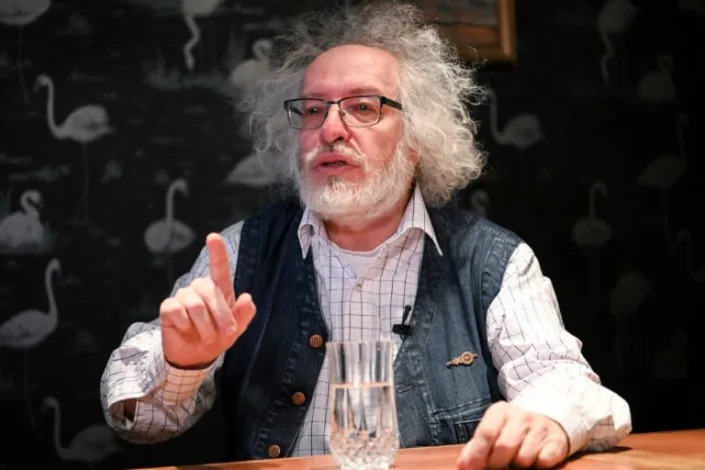The most senior cleric in the Church of England, Archbishop Justin Welby, has become the latest high-profile critic of UK Prime Minister Boris Johnson's plans to send asylum-seekers to Rwanda. While acknowledging that the agreement's details remained with politicians, Welby stated that relocating asylum-seekers to another country posed significant ethical concerns:
"A country like Britain informed by Christian values cannot sub-contract out our responsibilities, even to a country that seeks to do well like Rwanda," the Archbishop of Canterbury told congregants during a Sunday service.
The United Kingdom and Rwanda made headlines on April 14 when they announced that migrants arriving in the UK irregularly would be sent some 6,400 kilometers (4,000 miles) away to Rwanda. There, Rwandan authorities would be in charge of processing their asylum claims, and, if successful, they would be allowed to stay there.
London said it will contribute up to £120 million ($157 million, 144 million euros) towards the controversial pact.
According to the British government, the idea will deter individuals from attempting risky crossings of the English Channel and will put human-smuggling organizations out of business.

Human rights groups accuse President Paul Kagame of suppressing basic freedoms in his country
Rwanda's role
Critics say Rwandan President Paul Kagame is seeking to present his country as an ally of the West.
The 64-year-old leader, who has long been accused of various human rights violations and of silencing his political opposition, has a track record of taking actions that please foreign governments:
Kagame has deployed thousands of Rwandan troops to the continent's confilct zones, including Mozambique, Somalia, and the Central African Republic. Observers credit the Rwandan soldiers for succeeding in pushing back an Islamist insurgency in Mozambique's volatile Cabo Delgado Province.
The UK asylum deal could be seen as an extension of Kagame's pro-Western approach. The president, however, defended the deal, saying it was not about "trading people" but that it would offer a chance to asylum seekers to begin a new life.
Human rights groups shocked
Human rights organizations and the United Nations have expressed disbelief over the proposal, criticizing the plan in the harshest terms.
"The fact is that Rwanda has an abysmal human rights record. This is a country where freedom of speech is not respected," Lewis Mudge, Central Africa Director at Human Rights Watch, told DW. In 2021, Rwanda was ranked 156th out of 180 countries in the Reporters Without Borders (RSF) World Press Freedom Index.
Mudge, who lived in Rwanda, added that Rwanda is one of the most populated countries in terms of population density on the continent: "There's not a lot of open land. It's difficult to see how they could take tens and tens of thousands of people."
He further stressed that it's not only Human Rights Watch and other international organizations that have come to this conclusion but that the British government as recently as last year shared the same assessment: "So it smacks of real hypocrisy that all of a sudden the British Prime Minister can go ahead and say that this [Rwanda] is one of the safest countries in the world when this contradicts his own government's position."
The UN refugee agency UNHCR has distanced itself from the bilateral agreement, saying it was not involved in the process. In a statement published on its website, Gillian Triggs, UNHCR Assistant High Commissioner for Protection, said the agency "remains firmly opposed to arrangements that seek to transfer refugees and asylum seekers to third countries in the absence of sufficient safeguards and standards."

Rights activists have raised concerns about the rights of refugees in the deal
Could Rwanda handle a refugee influx - and how?
Last year, Rwanda offered temporary asylum to Afghans fleeing the Taliban takeover. In addition, the landlocked East African nation welcomed hundreds of African refugees stranded in Libya. According to the UN refugee agency, UNHCR, Rwanda had 127,163 refugees and asylum seekers in the country as of September 2021.
However, there have been concerns about Rwanda's capability to host more asylum seekers. Measuring just 26,338 square kilometers (10,169 sq mi) in size, the landlocked nation is the fourth-smallest country in Africa.
This is only one of the reasons why Rwandan opposition parties have dubbed the deal "unrealistic and unsustainable," calling on the government to focus rather on fixing the country's own problems.
Mudge says he is also worried that the deal and its process of vetting the asylum seekers remains shrouded in secrecy: "It's going to be very difficult for us on the outside of Rwanda to know how that's going because these refugees are not going to feel that they can speak out openly against any type of policy."
For now, Rwanda and the UK seem undeterred by any criticism and have vowed to start the process of finalizing the deal in the coming weeks.
Rwanda's other migrant deals
Above all, the question remains whether the migrants who are sent to Rwanda will choose to stay there. According to Mudge, "Rwanda has engaged in other types of agreements with other countries, most notably Israel, in which asylum seekers or refugees were taken to Rwanda.
"These people very quickly left, and got into dangerous situations once they're outside Rwanda again."
Following the announcement of the UK-Rwanda deal,Denmark has also informed the public that id is reportedly in talks with Rwanda for a similar agreement. Danish immigration minister Mattias Tesfaye told Reuters that his government's "dialogue with the Rwandan government includes a mechanism for the transfer of asylum seekers."
As Denmark is in the European Union, any such unprecedented attempt to bypass EU law could lead to serious consequences for the entire bloc.
DW has tried to reach out for comment from the Rwandan ministry of disaster management and refugee affairs and the International Migration Office in Rwanda but received no response.
DW
SEE
https://plawiuk.blogspot.com/2022/04/uk-plan-to-fly-asylum-seekers-to-rwanda.html
https://plawiuk.blogspot.com/2022/04/uk-rwanda-asylum-plan-against.html
https://plawiuk.blogspot.com/2022/04/priti-patel-facing-mutiny-over-rwanda.html























